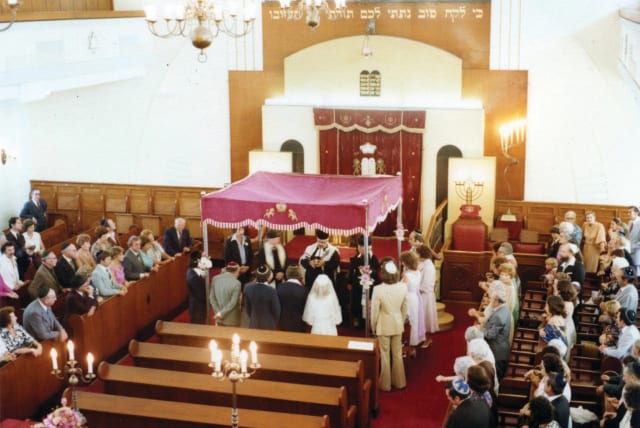Shavuot: 7 things converts can teach us about Judaism

Just as our sages learned about Jewish affirmations from Ruth, so I have found through my work with converts that we can learn much about Judaism from them.
On the festival of Shavuot, it is customary to read the Book of Ruth. There are multiple reasons for this, but I will focus on just one.
Ruth is a convert, and converts are those who accept upon themselves the commandments of the Torah, so this is an appropriate story to be read on the festival of the giving of the Torah. The Talmud learns multiple laws of conversion from Ruth: Just as Naomi told Ruth three times to go back to Moab, so too one should discourage a potential convert up to three times (but not more).
In addition, Ruth makes a famous affirmation of faith: “Your people shall be my people and your God, my God.” From this we learn the two elements of the Jewish faith – the connection to the people and to the belief.
The Talmud (Yevamot (47A) takes Ruth’s statement very seriously: “A convert who comes to convert nowadays, you say to them: ‘What made you decide to convert? Don’t you know that the Jewish people at this time are anguished, suppressed, despised and harassed, and hardships are visited upon them?’ If they answer: ‘I know, and I am unworthy [to even join them],’ you accept them immediately, and then you inform them of some minor and major commandments, as well as informing them of the sin of neglecting gleanings [leket], forgotten sheaves [shikhekha] and field corners [pe’ah, for the poor], as well as the poor man’s tithe [ma’aser ani]. You also inform them of the punishment [for transgressing] negative mitzvot.”
The questions relate first to the connection with the people of Israel and only afterward to the faith, like the order in which Ruth made her affirmations. The leket for the poor echoes the Ruth story as well.
Just as our sages learned about Jewish affirmations from Ruth, so I have found through my work with converts that we can learn much about Judaism from them. I will list seven things I learned from them.
1. Not everyone out there hates us.
In Israel, there seems to be a pervading mindset that the whole world is against us. However, there are many out there who like us. We just like focusing on those who don’t like us. The ones who do, we don’t take seriously. I have discovered over and over that many people out there are fascinated with Judaism, the Jewish people and the State of Israel. My students, especially those who have no Jewish roots, are proof that the message of the Jewish people and of Israel does not fall on deaf ears.
This is true not only regarding converts. I teach an annual course in Jewish studies at the University of Bucharest. I am always amazed at the number of non-Jews who are fascinated with Judaism and Israel. They ask me to take them to the synagogue, they want to learn more, but not necessarily to convert. Some even want to understand the roots of their own Christian religion.
In Tel Aviv, I have been teaching converts for about 12 years. Since the classes are in English, the students are from many countries. I always tell people it’s sort of like the UN, the only difference is that they are pro-Israel. People who come in from the outside tend to see things that people who are born on the inside do not. We take a lot of things for granted. When I ask students what brought them to Judaism, the answers are multiple.
One woman told me that the belief in family attracted her. A man from Sweden told me he was looking for spirituality which he did not find in his country of birth. A woman from Italy said that she was surprised to find young people talking about developing a connection with God. In another case, a student from Brazil, who discovered her Jewish roots, became fascinated with the Jewish story. Outside of Israel, the most common reason for conversion is marriage. In Israel, the majority of converts are not married but many have partners.
Interestingly enough, Ruth, the biblical convert, also converted for her marriage to Mahlon. There is controversy about whether Ruth converted before marrying Mahlon or after his passing. The Talmud (Yevamot 47B) seems to imply that she was converted by Naomi after the passing of her husband. However, as Ibn Ezra argues, the text seems to imply that it happened prior to her marriage to Mahlon, otherwise Boaz would have had no obligation toward her as a “redeemer” through a levirate marriage (a type of marriage in which the brother of a deceased man is obliged to marry his brother’s widow).
2. Not everyone who appears to convert for a partner does so for that reason.
In Israel, many converts, especially women, come to our classes to straighten out their Jewish status before meeting a partner. Others find a partner, in which case both are obligated to attend the classes. After all, they have to work together if they want to build a family together.
Just three weeks ago, I was sitting in the beit din (rabbinical court) in Tel Aviv with students going through interviews with the dayanim (rabbinical court judges). The first couple were married under civil law. They had a young daughter. The woman had discovered some Jewish roots while in Germany. She met a young Jewish Israeli, and they wed. She insisted on converting, even though her husband was not from a particularly religious family. Today, she is the one leading the way to making their household Jewish.
In another case, a Russian-born woman with a Jewish father made aliyah. She met a man from a religious home who had moved away from religious life. She wanted a religious home. He, of course, knew what to do in this regard, but his childhood experiences made him hesitant. I said to him: “You met a wonderful woman who is excited about becoming Jewish. Learn from her excitement. Share her experience and her joy, and it will help you see your childhood Judaism in a new light.”
In another instance, a woman from Bratislava met an Israeli Jewish man, and they wanted to wed. She studied with him for conversion. One day, at the kiddush in the synagogue, she told me that she actually was interested in Judaism before she met her partner and actively looked for a Jewish partner in order to convert.
3. Converts are serious about being Jewish, and so should we.
There is a stigma in Israel concerning converts. The secularists belittle their desire to become religious, and the religious don’t take them seriously. A former graduate of ours from Brazil did a post-doctorate at Tel Aviv University. Her secular colleagues made fun of her for keeping Shabbat and Jewish customs, but she politely ignored it. Another student from Italy, studying for a post-doctorate at the Hebrew University, Jerusalem, experienced the same. On the other hand, according a to recent poll, 59% of Religious Zionist Jews when asked, said they would not want their children to marry a convert.
I think the problem is their misunderstanding of what conversion is. They think that converts are not interested in keeping Jewish law (halacha), and they are surprised when I tell them that they are. All they need to do is sit in any one of my classes for 10 minutes to find this out. However, people from religious homes do not understand what would attract someone from the outside to embrace Judaism. This is not the convert’s problem but their own.
Contrary to public belief in Israel, the average convert has no problem keeping the commandments. That is what conversion is about. Even if you raise the bar, they will jump over it. They just want to be treated with respect. Outside of Israel, many communities make Orthodox converts wait for years. In Israel, the opposite is the case; there is constant pressure by politicians to lower the demands we make of converts based on the false assumption that the average convert is not interested in keeping Jewish law. This, of course, is an insult to generations of truly pious converts.
4. ‘Dos pintele Yid’
There is a Yiddish expression about the Jewish spark, “dos pintele Yid.” I am always amazed how many converts discover Jewish roots after converting. I have a Polish friend who converted to Judaism. She discovered her Jewish roots after the fact and spoke to other friends of hers who had the same experience. Was this some subconscious spark bringing them back to Judaism?
The craziest story I heard was in Prague 15 years ago. I went to pray at the Synagogue on Jeruzalemska Street. After the service, there was a kiddush where I met a young woman who spoke perfect English. She was born in Prague, but her father worked for the communist government and was sent to London as an envoy for the Department of Trade. After the fall of communism they returned to Prague, where they lived as atheists. One day, the woman came across a synagogue and walked in. She was fascinated by what she saw, so she started reading about the Jewish people and felt drawn to the whole story. She met with the rabbi and asked to study for conversion. After a few months, she told her mother about her desire, but her mother showed no interest.
After conversion, she informed her mother that she had converted. Her mother answered: “Once you already converted, you might as well know that both your mother and your father are Jewish.”
5. One should regard the commandments not as a burden but as an opportunity.
As adults, we are envious of young children who are amazed by everything the world brings their way. As religious Jews, we sometimes see the commandments as more of an obligation than something to delight in. Converts are fascinated by every detail. Through them, I realized how interesting the smallest minutiae of Jewish life can be.
6. It’s worth giving up everything to be Jewish.
As olim from first world countries, we are well aware of the price we had to pay to make aliyah. In Israel,the converts have to go an extra mile – they leave their families and countries of birth to come to a foreign country, adopt a new language and commit to a people they so dearly want to join, despite knowing that many Jews are less than enthusiastic about being Jewish.
7. It’s not about politics.
Converts have many different views about Israeli politics, but they all love the Jewish people and the State of Israel. This is a lesson in itself.
Shavuot sameach.
The writer, a rabbi, is a senior lecturer at Bar-Ilan University and teaches conversion classes in Tel Aviv.
Jerusalem Post Store
`; document.getElementById("linkPremium").innerHTML = cont; var divWithLink = document.getElementById("premium-link"); if (divWithLink !== null && divWithLink !== 'undefined') { divWithLink.style.border = "solid 1px #cb0f3e"; divWithLink.style.textAlign = "center"; divWithLink.style.marginBottom = "15px"; divWithLink.style.marginTop = "15px"; divWithLink.style.width = "100%"; divWithLink.style.backgroundColor = "#122952"; divWithLink.style.color = "#ffffff"; divWithLink.style.lineHeight = "1.5"; } } (function (v, i) { });

